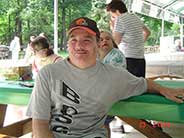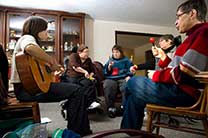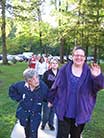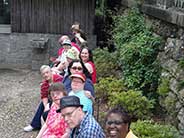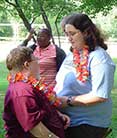What Is a Circle of Support?
A circle of support is a group of relatives, friends, and community members who agree to work together to provide ongoing assistance and support to a person with a disability.
Think of the circle of support as a team for life. It can be as informal as a meeting to discuss major changes and plans for the future with a few family members and friends, or as formal as a corporation.
- It is different from the DD professionals who provide expert help to your child. Such professional teams may develop an individual education plan (IEP), assist in getting access to vocational training, or coordinate other services. Unfortunately, these support professionals last only as long as the services provided.
- A circle of support is designed for life. It consists of people who have a personal relationship with and interest in the individual for whom the circle is formed, including family members, friends, neighbors, coworkers, and anyone else (sometimes even paid professionals).
- Members are not paid for their help. Members can remain in the circle of support even if an agency transfers them or funding is cut off.
- Members of the circle may change over time. People may move away or may be unable to sustain a commitment for personal reasons, but new people can then be invited into the circle.
Remember: Members of the circle will gain from the experience as well. A circle of support is not about one person’s dependence. It is about interdependence. Members of the circle will discover the child’s gifts as they interact with him or her. They will doubtlessly also learn more about themselves in the process.
How To Create a Circle of Support
Every person, regardless of ability, needs someone to depend on and value.- Consider Everyone Who Cares:
- There are no particular qualifications for joining, though people with skills or knowledge related to support services or your child’s other needs are especially valuable.
- It is also important to include people from outside the DD field. They often offer the most creative ideas.
- Invite Members Individually: People often appreciate being invited.
- Give each person information about the purpose of a circle of support and the work/time commitment involved.
- They should then be given time to decide. Some may decline, but those who remain clearly want to be there, because they care for the child.
- Facilitate Initial Group Meetings: Once members have accepted, they can be brought together.
- You may need to facilitate the group initially, but members should eventually feel comfortable enough to work without a specific leader.
- This will happen if everyone understands the purpose of the group and listens without criticism.
- Keep Your Child Involved: Your child should share his or her feelings. This may require some creativity if your child does not communicate in traditional ways.
- Address the Everyday Then the Future: The circle’s first goal is to address everyday needs and concerns. Then, everyone can share in creating a vision for the future, beginning by imagining the perfect outcome for your child.
- Share Responsibility: The group should share responsibility for reaching your child’s goals.
- For example, someone at home during the day can make phone calls to look into available resources and programs. A member familiar with finances can research funding sources. A person with a medical background can investigate available therapies.
- To make proper decisions, bring in professionals or advisors as needed. For example, housing corporation staff, residential services providers, or financial planners. NOTE: Some of these advisors may charge a fee.
- Meet Regularly: Meet regularly to review progress, find out how your child is feeling, and make adjustments in the plan.
- How often a circle meets will depend on what is happening in the child’s life. Meetings may be more frequent during major decisions, then once or twice a year if your child is settled and doing well.
- Share In the Joy: A circle of support is important for good times as well as the bad. It’s helpful to your child when members can share the joy of each achievement.
The Importance of Natural Supports
Natural supports are personal relationships developed in the community that enhance the quality and security of life. These are everyday social relationships, more informal than the circle of support, and may include family, friends, fellow students/employees, and associations via clubs or other civic activities.
“Most people in the community just aren’t ready to be with our kids.”If this sounds or feels familiar to you, it may be because these casual, but essential, natural supports have become more difficult for persons with intellectual disabilities for several reasons.
Why Natural Supports Are Hard to Find
First, the increased use of Medicaid funding for residential support services pays to keep people safe and healthy in their homes. It does not pay for people to find friends or make community connections, but instead assumes that people will do this on their own.
In addition, residential support services are provided in smaller settings than in the past, with an unintended side effect—isolation. In the past, institutions and large group homes provided many people for camaraderie and friendship. When a person lives in a home with just a few roommates, he or she can easily become isolated.
Finally, the system has changed from a facility-based model of services to one that provides specific, individually-designed services. Hence, the risks of institutional living have been replaced with the struggles of people alone in their homes. Now, parents and family must seek out natural, unpaid supports in a person’s life to provide needed companionship and assistance.
Making The System Work For Your Child
Remember, the system assumes that people will make their own friends and community connections. An obvious benefit to this trend in Medicaid and support services is that costs decrease. Other benefits can include increased dependability and personal satisfaction. Natural supports can be more meaningful when you, your child, and your circle of support have to seek them out.
For example, a neighbor may be willing to drive your child to church or to medical appointments. An acquaintance can pick up a prescription or a gallon of milk. A coworker may sit with your child during breaks at work.
Though everyone needs natural supports, they are especially important for people with intellectual disabilities because of the frequent changes in the paid system of support services.
Seek out and nurture these natural supports. They may include people who live and work in your child’s neighborhood, official community “welcomers,” and community organizations offering social activities open to people with intellectual disabilities.



